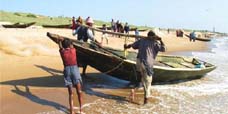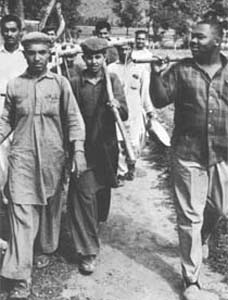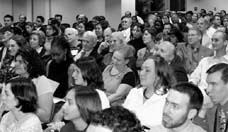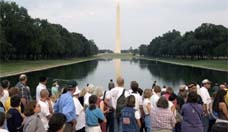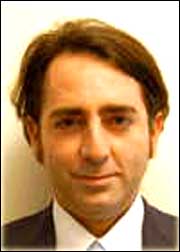
RPCV Jason Ben-Meir says: When communities work together to realize their development goals, they also establish local associations (core civil-society institutions) to manage projects and create new ones.
A Moroccan rural development strategy
For a Free Trade Era with the United States
By Jason Ben-Meir 3/31/2005 | 12:07 am
Throughout the winter and spring of 2003, meetings among community members, government officials and NGO representatives were held in the High Atlas Mountains, south of Marrakech.
Jason Ben-Meir.
The villages in this region are among Morocco's poorest, with extremely high rates of infant mortality (mostly due to unclean drinking water), illiteracy and joblessness. Their dependence on wood for cooking, and on grazing animals as their main source of income, has contributed to massive deforestation and mountain erosion.
The dialogue resulted in a USD 10 million development plan for the region. If funded, the plan would significantly help secure the economic, educational, health and environmental future of 50,000 people, by establishing projects in drinking water, modern irrigation, fruit and forestry tree planting, school construction, women's cooperatives, food production, mountain terracing, water-generated electricity and artisanal crafts.
What is the “magic bullet” so to speak of these projects?
Genuine community development takes place when community members collaboratively design and manage projects that generate for themselves a broad range of socio-economic and environmental benefits. By directly responding to its self-defined needs, the community has a strong incentive to maintain the projects established by its members.
When communities work together to realize their development goals, they also establish local associations (core civil-society institutions) to manage projects and create new ones. New ties of cooperation then form as neighbouring communities join together in implementing projects beneficial to the entire region. In brief, achieving local development through inclusive community dialogue has positive economic and political consequences.
This past May, HM King Mohammed VI said the following before the Supreme Council for Town and Country Planning:
"In discharging your mission, you must bear in mind the special importance I attach to citizen participation, close-proximity policies [or decentralization] and the role played by local and regional councils." Communities working together to design and implement development projects is the realization of this important statement.
Community-designed development can be extremely effective in combating the brutal effects of free trade on subsistence farmers, which include a sharp decline in employment, falling prices for farm products, lower land prices, urban migration, rising income inequality and an increasing agricultural trade deficit. Under the North American Free Trade Agreement (NAFTA), Mexico experienced these effects, challenging conventional wisdom that agricultural liberalization is good for a developing country in a trade relationship with a developed economy.
Mexican cereals, grown using traditional methods, cannot compete with US subsidized agricultural production (especially corn), and with their traditional employment undercut, farmers have been forced to look for work in urban areas. We now understand, however, that diversification of rural income sources can prevent the displacement of farmers caused by free trade. And, in communities designing and implementing their own projects, income diversification has been a result.
The Kingdom of Morocco and the United States have now signed and ratified a Free Trade Agreement to eliminate all tariffs within 15 years. For the United States, this is the first agreement with an African nation, the second with a Middle East country (after Jordan) and a model for future trade Agreement in the region. Though there are some protective measures in the agreement for rural farmers, it is now critical that Morocco invest heavily to prepare its 13 million rural people for the difficult adjustment they face. As one community member expressed in an open forum meeting near Tafraoute: "We wouldn't want to move to the cities if we had the means to achieve the goals of our village."
Notwithstanding the recent fourfold increase in economic aid to Morocco (to roughly $170 million over three years starting in 2005), the United States should do much more to fund transition programmes as part of the trade package.
This should be in the form of a substantial increase of funds for locally-designed projects that achieve the development goals of Morocco's rural people.
There are plenty of examples around the world of development agencies, both governmental and non governmental, who successfully organize broad participation in a community or group of communities and achieve lasting development. In order to organize participation in rural communities across a country, however, institutions need to be created whose mission is to help local people design projects that meet their needs and create partnerships among groups that support community development. Clearly, a national mobilization to achieve community development would require support from all sectors and levels of the Kingdom. In Mexico, the uneven impacts of free trade have not been effectively offset by appropriate government policies that assist those in declining sectors.
The following four suggested initiatives will create socio-economic development for rural Morocco, by encouraging broad local participation in the design and management of new projects. Implementing these initiatives will shift Morocco's rural population to new and sustainable sources of employment and income, enhance their education and strengthen their social safety nets in preparation for trade-induced economic restructuring.
A. Establish community development planning and training centres:
These centres, situated in communities and locally managed, facilitate an interactive process that enables communities to determine their priority goals and then to design and implement projects to achieve them. Centres also provide training in facilitation, modern agriculture, health, fundraising and other skills desired by the local population. In addition, centres can assist in reconciling conflicts that inevitably arise during local development processes. In sum, they provide one-stop shopping for community development needs and do so in ways that transfer needed skills to the local population.
Facilitation methods used to achieve genuine community development are very similar to conflict management procedures. Their techniques are based on dialogue and the use (though not indefinite) of a third-party, which helps ensure an inclusive and productive process. The interactive community development experience that creates mutually beneficial relationships also builds trust among the participants, just as conflict management procedures do.
Broad participation in community development undermines extremism by strengthening indigenous democratic processes that generate economic prosperity. Community empowerment occurs through a gradual, non-violent and, as examples show, widely accepted process because of the many collective and individual benefits the community experiences. As people achieve their own interests, they feel less alienation; their zone of tolerance also expands because the underlying conditions that fuel extremism are being directly addressed. Those affected are then less likely to channel hatred toward outside actors.
Two fundamental elements of pluralist democracy are the dispersion of power towards the interior (localities) and the inclusion of all social groups in decision making.
Agencies of community planning and training centres are pluralist democratic institutions because they strengthen the capacities of communities to manage their own development. Additionally, the partnerships that are created in the process among public, private and NGO groups encourage greater accountability and transparency, which help to prevent corruption.
Community members and leaders who have acquired the skills to achieve collaborative development and experienced its benefits make excellent candidates for local and national elected office. Their experience has been shown to give with the confidence and strategies to run for public office. They have understood that an effective political campaign begins with a series of town hall meetings where local people are given the opportunity to express their concerns and interests. They realize too that inclusive collaboration in the design and management of local development opens the door for their nation to achieve its development potential.
On Throne Day in 2003, His Majesty stated that:
"…efforts to build a stronger democracy will still be inadequate unless there are strong political parties. But what clout can political parties wield if they fail to fulfil their guiding role as representatives of citizens, particularly young people? How are we to ensure that our political scene is shielded from organizations or groups which advocate the division of society into religious and ethnic clans, those whose one and only goal is to make electoral gains, instead of competing fairly to develop tangible programmes and to help train enlightened and dedicated people? … I strongly believe that useful education is an essential ingredient in freeing the minds of young people and enhancing their sense of belonging and citizenship, and also in equipping them with the skills they need to take up the challenges of development and globalization and to cope with the requirements of the knowledge and communication society."
Broad participation in community development has been shown to be a transformative educational experience for those involved, mainly because the community members, government officials, and NGO representatives who participate share their knowledge and become sensitive to the needs and interests of each other. Additionally, training rural school teachers in facilitating community development will help them to productively channel their idealism and energy for the benefit of the community in which they are serving. A new local political leadership in time will emerge, one that understands and is dedicated to addressing the real issues of concern to citizens. In these ways, participatory planning and training centres provide the educational forum that catalyzes political change. Centres can be one example of what His Majesty calls, “close-proximity policies.”
B. Implement Fruit and Forestry Tree-Planting, Irrigation Improvements, and Drinking Water Systems:
Morocco's rural communities regularly identify tree planting as a top priority. Trees provide income, jobs, and enhance the environment. Modern irrigation maximizes the utility of water supplies, increases yield, lays a foundation for potable water, and creates the opportunity for schools, clinics, and other service centres to be built. A national campaign can implement the planting of millions of fruit and forestry trees and saplings every year.
The United States should help fund tree planting, irrigation improvements and drinking water systems in rural communities. The current American Ambassador in Rabat, Thomas Riley, is now seriously considering expanding an earlier tree planting project funded by his predecessor.
The late King Hassan II called planting a tree an "act of faith" and American financial support will generate public good-will with local people.
C. Fund community development:
Funding is needed for planning and training centres and, to a much larger degree, for implementing projects local communities design. Three billion dollars of new funding for community-designed development should create a prosperous future for Morocco's 13 million rural people.
This cost projection is based on the High Atlas experience cited earlier, which requires USD 10 million to achieve broad-based development for 50,000 people. For a relatively low cost, far less than that of typical aid programmes, this approach to rural development may turn out to be one of the most effective tools we have to combat the displacement of rural people caused by free trade.
In addition to helping to organize donor conferences, the American ambassador to Morocco should appoint a special envoy for community development. The appointment will show that the full weight of the ambassador's office is behind raising funds. These envoys can also assist in establishing local projects, such as tree planting, beyond the geographically limited US projects. Morocco's ambassador to the United States, Aziz Mekouar, has been extremely supportive of events that raise awareness and funds for the community development of Morocco. A wide pool of prospective donors exists who can be mobilized because multiple sectors (economic, social, health, education, environment, etc.) are advanced in this development approach. As community resources improve, outside funding will become less necessary.
A new foreign aid initiative, the Middle East Partnership Initiative (MEPI), announced by Secretary Powell in December 2002, is designed to address under development in the Middle East. Its promotion of civil society, education, private sector development and equal status for women makes it a viable funding vehicle for the development strategy outlined above. But MEPI's fiscal year 2004 budget of USD 145 million (for the entire Middle East) is grossly inadequate for it to achieve its development objectives.
In March 2002, at the United Nations development summit in Mexico, President Bush announced his intention to establish a USD 5 billion annual fund by 2008 (added to the USD 12.5 billion the United States now gives in foreign assistance) to promote growth through the creation of the Millennium Challenge Account (MCA). For the fiscal year 2005, MCA's budget is USD 1 billion and Morocco and 15 other nations are eligible to submit project proposals.
Eligibility is determined by how countries perform according to 16 socio-economic indicators. For MCA projects to be successful, however, its administrators need to make certain that not just host-government agencies but also local communities formulate the ways in which aid money will be invested.
Even with MEPI and MCA, the amount of US funding of foreign aid is depressingly small. Though MCA represents the largest US foreign aid increase in decades and solidifies the US position as the largest donor in the world, foreign aid constitutes about 4.5 % of the annual Defense Department budget. The United States still ranks towards the very bottom of the list of 24 nations that contribute to overseas aid (contributing about 0.15 % of our GNP), well short of the goal of 0.7 % of a nation's GNP set by the UN in 1970. Part of the reason there has not been more foreign aid for decades is because only a few studies show a clear correlation between aid flow and economic growth in the countries where it has been distributed. However, community-designed projects have an extremely high success rate and as such are hardly a futile enterprise.
For the US to financially support this new direction for development assistance requires that policymakers think very differently about how lasting prosperity can be achieved in developing nations and the absolutely vital role local communities must play in the process. The leaking of the American “Greater Middle East Initiative” working paper before this past June's G-8 summit where it was intended to be presented showed us the damage that can be done by not including the beneficiaries in the design of reforms that impact their lives. That proposal, which sought to create economic, political, and cultural change in the Middle East and other Islamic countries, was harshly criticized by Arab and European leaders who felt the Bush administration did not consult the countries it seeks to develop. President Hosni Mubarak of Egypt immediately called this approach of dictating change "delusional." Consultations with Middle East and Islamic countries should have been so extensive in developing such a plan, that they should have been the ones that drafted the proposal and presented it at the summit meeting.
Middle Eastern and other Islamic countries would then have had “ownership” of the reform plan, a critical element for it to be successfully implemented and for gaining maximum international, especially European, financial support. Instead, only seven countries (Bahrain, Iraq, Jordan, Tunisia, Yemen, Afghanistan, and Turkey) attended the summit luncheon. Arab countries that are among the most important, including Morocco, Egypt, and Saudi Arabia, refused to take part. Additionally, Europeans showed a lack of enthusiasm and there was no new financial support. It is now highly unlikely that this initiative will catalyze the development process in the Islamic world that the United States had hoped to achieve.
Development cannot take root and will not be sustained unless the intended beneficiaries are in control of its design and management. The lack of understanding of this basic principle in the administration of foreign aid by donor nations accounts for much of the failed international development attempts in the past.
Hopefully, U.S. policymakers now better understand this, due to their experience with the Greater Middle East Initiative.
D. Establish an agency of coordination:
An "agency of coordination" is an administrative framework that organizes the achievement of the above initiatives.
It has the flexibility to operate at local, provincial, national and international levels in order to negotiate partnerships (among communities, government agencies and NGOs) that promote local development.
His Majesty in October 2003, speaking about the future challenges of the Arab world and Africa, stated that the "human element is to be given special importance as an intrinsic cultural asset and the main ingredient of any meaningful development strategy." In South Africa during the World Summit on Sustainable Development in September 2002, he called for genuine public-private partnerships among regional and international organizations. The purpose of an coordination is to forge the necessary partnerships to achieve the potential of the human element in rural communities across Morocco. Active Royal support will allow this proposed agency to have maximum effectiveness in pursuit of its mission and create the community development mobilization that this strategy describes.
Supporting communities in achieving their self-described goals will secure the socio-economic future of rural Morocco in a free trade era with the United States. The United States should play a major role in mobilizing new financial resources to support the rural development of Morocco, which will also improve its image among communities across the Kingdom. By transforming the economic and political landscape for those who lose as a result of free trade, this rural development strategy will bring lasting prosperity to millions of people.
Jason Ben-Meir is pursuing a Doctorate in Sociology at the University of New Mexico. A former Peace Corps volunteer who served in Morocco, he is currently President of the High Atlas Foundation, a nonprofit organization that assists community development in Morocco. He is also a fellow at the American Institute of Maghrib Studies.







